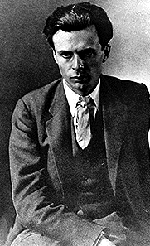ALDOUS HUXLEY' S BIOGRAPHY

Aldous Huxley was born on July 26, 1894. He belonged to a distinguished scientific and literary English family. His father, Leonard Huxley, was the editor of the Cornhill Magazine and his mother was the sister of the novelist Humphrey Ward and the niece of the poet Matthew Arnold. His grandfather was Thomas Henry Huxley, a supporter of Darwin and a famous educator.
Since his childhood Aldous Huxley already felt different from the others. He did not felt part of the class into he was born.
When he was 14 years old his mother died of cancer and that affected Huxley and his future works in a powerful way.
He tried to study medicine at Eton but when he was 16 he got an eye illness that almost blinded him. Later he could recover enough vision to go to Oxford University and being still a student he turned to literature and published two volumes of poetry (1916). He met writers like Lytton Strachey and Bertrand Russell and he became in a close friend of D. H. Lawrence. Huxley was graduated with honours.
However, his vision was not good enough for going to fight in World War I or for doing the scientific work he dreamed.
In 1919 he married Maria Nyls and in 1920 it was born their child Matthew. In the 20s the family travelled around the World visiting Italy, India, United States... In 1937 they moved to California. His experiences in the places he visited influenced his works.
His early writing included poetry, short stories, and literary journalism but his reputation was established with his first novel, Crome Yellow (1921) where Huxley satires the intellectual pretensions of his time. His early comic novels include Antic Hay (1923), Those Barren Leaves (1925) and Point Counter Point (1928). In his volume of essays, Proper Studies (1927), he discussed philosophical and social topics.
In the 30s Huxley became critical of Western civilisation. So, in 1932 he wrote Brave New World, a bitterly satiric account of a society controlled by technology.
Other novels he wrote were Eyeless in Gaza (1936), The Doors of perception (1954) and Heaven and Hell (1956). In his works, Huxley denounced and criticised the orthodox attitudes of his time. At the beginning he was a moralphilosopher using fiction to transmit his ideas, but later he adopted a didactic tone.
When Maria Nyls died he married the American Laura Archera, with whom he lived in California (1956). Here, because of a canyon fire, he lost his library, full of books and manuscripts.
In 1958 he published Brave New World Revised, a set of essays about real-life problems and about overpopulation, overorganization, psychological techniques, etc., ideas that a government could use to deprive people of freedom. Huxley wanted to fight against this.
In the 50s Huxley got a big interest on psychedelic ormind-expanding drugs like mescaline and LSD. He and his wife took LSD together enjoying happy psychedelic experiences. He wanted to find a physically and socially harmless drug to escape from the self. So, taking his experiences on mescaline, he wrote Doors of Perception (1954) and Heaven and Hell (1956), but he warned of the dangers of experiments with drugs in an appendix he wrote to The Devils of Loudun (1952). It was also in this atmosphere that Island (1962) was written.
Huxley wrote 47 books in his career as a writer. In 1959 the American Academy of Arts and Letters gave him a prize given every five years; the Award of Merit for the Novel.
He was a pacifist and an ecological man. He wrote an essay on ecology that was used by the environmental movement.
Huxley died the same day that President John F. Kennedy was assassinated, on November 22, 1963.
BIBLIOGRAPHY
http://www.kirjasto.sci.fi/ahuxley.htm
http://www.the-wisdom-store.com/aldous.html
http://www.primenet.com/~matthew/huxley/huxbio.html
http://www.levity.com/corduroy/huxley.htm